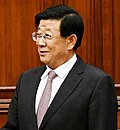Secretaries of the CCP Hebei Committee
| No. | Image | Name | Term start | Term end | Ref. |
|---|---|---|---|---|---|
| 1 |  | Lin Tie (1904–1989) | September 1949 | August 1966 | [1] [2] |
| 2 | Liu Zihou (1909–2001) | August 1966 | December 1979 | [1] | |
| 3 | Jin Ming (1913–1998) | December 1979 | June 1982 | [1] | |
| 4 | Gao Yang (1909–2009) | June 1982 | May 1985 | [1] [3] | |
| 5 | Xing Chongzhi (1927–2000) | May 1985 | January 1993 | [3] | |
| 6 | Cheng Weigao (1933–2010) | 27 January 1993 | 8 October 1998 | [4] | |
| 7 | Ye Liansong (born 1935) | October 1998 | June 2000 | [5] | |
| 8 | Wang Xudong (born 1946) | June 2000 | December 2002 | [6] | |
| 9 | Bai Keming (born 1943) | November 2002 | August 2007 | [7] | |
| 10 | Zhang Yunchuan (born 1946) | August 2007 | August 2011 | [8] | |
| 11 |  | Zhang Qingli (born 1951) | 28 August 2011 | 20 March 2013 | [9] |
| 12 | Zhou Benshun (born 1953) | 20 March 2013 | 31 July 2015 | [10] | |
| 13 |  | Zhao Kezhi (born 1953) | 31 July 2015 | 28 October 2017 | [11] [12] |
| 14 |  | Wang Dongfeng (born 1958) | 28 October 2017 | 22 April 2022 | [13] |
| 15 |  | Ni Yuefeng (born 1964) | 22 April 2022 | Incumbent | [14] |
